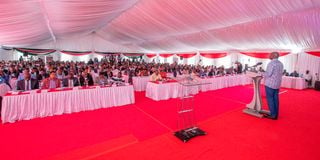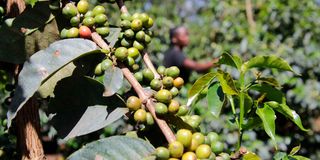Premium
How coffee sector is run by cartels and what DP Gachagua should do

Deputy President Rigathi Gachagua making his address during the Coffee Stakeholders Conference at Three Steers Hotel in Meru County, on June 9, 2023.
Some four years ago, I got a call from an official of the Thangaini Cooperative Society in Murang'a County. Thieves had invaded their stores six times and vanished with coffee worth millions of shillings.
None had been caught, and farmers were getting desperate. Thangaini produces some of the best coffee in the world, with its roasted Arabica AA beans fetching premium prices. A kilo of roasted Thangaini beans could fetch more than Sh4,000 at the international market.
“How are you going to help us?” the official, Hiram Mwaniki, asked me. He sounded like I was the last frontier. "We have been forced to hire six guards for every factory and this is an extra expense to the farmer." There was little I could do.
In Kenya, coffee thieves are hardly caught since the celebrated arrest of MPs Muhuri Muchiri and Jesse Mwangi Gachago in 1978 for stealing the “big man’s” coffee.
Today, the cartel networks of growers, millers, exporters and police work together, and farmers are under siege. At the international level, another network operates outside our control and has a system that has reduced our farmers into slave labourers.
This month, Deputy President Rigathi Gachagua organised coffee farmers' and leaders' meetings to look for a solution for what ails the coffee sector.
Déjà vu! The DP will need the skin of a rhino to confront the cartels, brokers and thieves at the local level and to think globally about how the coffee industry is structured. While he will require a multi-pronged approach, he won't get help from the Ministry of Agriculture, whose senior officials have always sided with the cartels.
In 1965, when Kwame Nkrumah wrote the book, Neocolonialism: The Last Stage of Imperialism, he argued that Africa, "however much it increases its agricultural output, will not benefit unless it is sufficiently politically and economically united to force the developed world to pay its fair price for its cash crops”. He then argued that "so long as African agricultural producers are disunited, they will be unable to control the market price of their primary products".
What Nkrumah said about then is still relevant today. A nation that cannot dictate the price of its premium product is a nation that has lost control of its economy.
While coffee is the second most traded commodity in the world, our coffee production has plummeted from a high of 130,000 tonnes in 1988 to a low of 34,000 tonnes in 2021 and 51,583 tonnes last year. Today, we rank number five in Africa in terms of production.
The meetings that Gachagua should be calling are of African coffee producers, and the first question should be: why are we exporting raw beans? Do we have the capacity to develop coffee industries within coffee-growing areas? How do other countries earn good returns from their coffee or other commodities?
Traditional colonial exploitation style
The problem with the coffee sector is that it is organised in the traditional colonial exploitation style, which has always stayed the same. Unless the government confronts the global chains like Ethiopia did, our farmers will continue to earn peanuts from their produce. Some 10 years ago, Ethiopia took on Starbucks and other chains and registered three trademarks for its speciality coffee.

Deputy President Rigathi Gachagua (centre) with Buuri MP Mugambi Rindikiri (left), Governors Stephen Sang (Nandi), Kawira Mwangaza (Meru) and Kahiga Mutahi (Nyeri) at Three Steers Hotel in Meru County on June 9, 2023, during the inaugural coffee conference.
These were Harar, Yirgacheffe and Sidamo. This licensing strategy meant that Ethiopia would build on the reputation of its coffee and build a strong brand. It also gave Ethiopian coffee more visibility since no one could infringe on the trademark. Secondly, anyone willing to trade with the trademark must sign licence agreements.
Starbucks tried to resist Ethiopia’s strategy, but there was a global uproar against it. Then, Ethiopia hired an international company to brand its coffee and distinguish Ethiopian coffee from the coffees of other countries. This arrangement has brought respectability to the brand, and the multinationals trading with Ethiopian brands treat it as a speciality.
Within one year, data from Ethiopian Coffee Exporters Association showed that the revenue increased by 59 per cent compared to income earned in 2009/2010 and 124 per cent from 2008/2009.
But in Kenya, we still assemble rural Mathira farmers and take them through irrelevant strategies — some inspired by cartels and their local networks. In my reporting career in the coffee sector, I was astonished at the audacity of international coffee merchants who would even have candidates in cooperative elections. This is where the price rigging starts.
Officials of cooperative societies are supposed to appoint a commercial marketing agent to safeguard their interests within the coffee chain. If Gachagua checks, he will find that the marketing agent and the miller are related. The price rigging starts with what is known as "the milling loss" — which refers to coffee lost during milling. Many cooperative societies have for years accused millers of manipulating milling losses and downgrading their coffee. At one point, the giant Othaya Coffee Cooperative Society was informed that its milling losses were between 25 and 35 per cent. This loss went down after they started milling their coffee.
Read also: Agriculture Food Authority warns of CS Linturi’s plan to revoke licences of coffee buyers
In such a case, the farmers are supposed to turn to their marketing agent. But since the marketing agent and the miller are owned by the same multinational, they conspire to ensure that farmers are short-changed. Cooperative officials are often corrupted to look the other way as their coffee is downgraded. Mr DP, the ministry has always known about this.
Marketing agents are supposed to be the farmers' brokers. They are the ones who present catalogues to the auction house. These catalogues are supposed to indicate grades, the number of bags on offer, the miller, the cooperative society and the hidden reserve price. The buyer (the dealer) should never know the reserve price.
Rigged system
But here in Kenya, you have a situation where the marketing agent and the dealer are companies owned by the same multinational. Therefore, the chance of leaking the reserve price to their parent company is high. So, we have a rigged system where outfits with different directors at the local level, but related at the international level, control the coffee value chain.
Previously, coffee from each factory was sold in what the dealers called "warrantable" lots. In this robbery-like arrangement, cooperatives with less than 200 bags for each grade — and most coffee factories could not get this number of bags per grade — had their coffee pooled together with other coffee factories and sold as “bulk” or “ungraded”. In this arrangement, top-grade coffee was auctioned as “ungraded” or under “bulk”, leading to immense loss to the farmer. What am I saying? Government officials have always allowed coffee farmers to operate within this opaque system and then they join them in complaining, shedding crocodile tears.
The marketing agents are only in place to seek business for their milling firms. Period. We are in this situation because the government looked the other way as Kenya Planters Cooperative Union's mill — the biggest in Africa — was vandalised and sold as scrap metal. So, we have commercial millers who grade the coffee in the dealer's interest.

A farmer tends to her coffee in Nyeri town on October 25, 2022. While coffee is the second most traded commodity in the world, our coffee production has plummeted from a high of 130,000 tonnes in 1988 to a low of 34,000 tonnes in 2021 and 51,583 tonnes last year.
The Nairobi Coffee Exchange, our auction house, is a crime scene. What I find intriguing is that farmers never get to know the quality profile of their coffee. The marketing agent (as a farmers’ broker) is supposed to appoint a liquorer to analyse the presented samples and to establish a benchmark for all other grades.
This is where collusion occurs since there is no independent liquorer in place. The buyers at the auction, known as dealers, can and often appoint experts to verify the seller's classification. Hence, the classification of coffee is a matter of expert opinion, of which there is no independent verification.
While knowing the quality of the beans presented, we still have cases where the marketing agent offers a very high reserve price to knock out any independent buyer or competitor. When this happens, the offered coffee lot is categorised as “noted bids” – meaning it has not attracted any buyer on the reserve price.
This “noted” lot could be sold at the next auction. The cooperative societies are supposed to be informed that their coffee did not attract any buyers, so they agree to a lower price. In most cases, they are not informed, so their coffee could be sold at ridiculous knock-down prices. Thus, premium coffee is sold at a throwaway price, and the farmers never get to know.
The other big lie is in the beans' classification. In Kenya, the beans are categorised by size. Farmers are told that big beans (AA) fetch premium prices, but customers at coffee outlets do not pay for coffee based on these classifications. Thus, coffee sold as “poor” grades TT, C, and T could still fetch premium prices at the consumer level. The loser is the ordinary farmer, who is duped to sell his coffee at a lower price.
Thus, the entire grading perpetuates a lie, and the loser is the coffee farmer. The introduction of marketing agents was supposed to help farmers get better pay for their produce. Instead, they come from the same block as the millers and the dealers.
If we are to revolutionalise our coffee industry, we must confront the major coffee-buying companies and roasters — US' Starbucks, Germany's Neumann, US' Stumptown, Swiss' Nestle, Kraft, Sara Lee, and Procter & Gamble — and end their colonial habits. These companies have taken advantage of the 1989 suspension of the coffee quotas by the International Coffee Organisation (ICO) to rule the world market and determine farmer prices.
Ethiopia has shown that something can be done. I did a series of these coffee stories in 2016, and the government started the Joseph Kieyah Task Force on Coffee. They recommended the way forward before they were taken to court by some “farmers”. On checking, I found that the multinationals were behind it, and Kieyah was also being sabotaged from within the ministry and the counties. After we sabotaged the task force, the farmer still gets underpaid — or their coffee is stolen and sold to the dealers, who have export licences but never appear at the auction house.
[email protected] @johnkamau1





